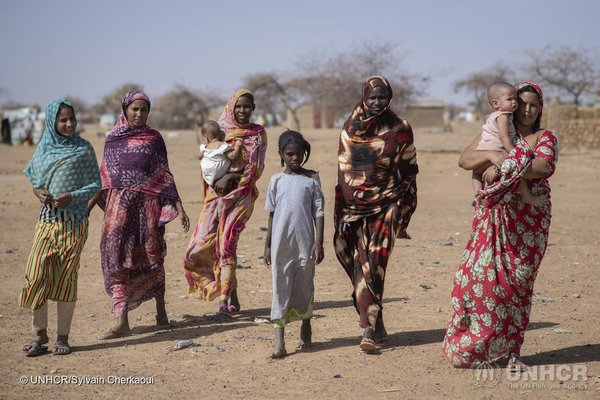 Read this article in French
Read this article in French- Share this article
- Subscribe to our newsletter
One per cent of humanity displaced
Forced displacement is now affecting more than one per cent of humanity – 1 in every 97 people – and with fewer and fewer of those who flee being able to return home, the UN Refugee Agency UNHCR reported in June 2020. Five countries account for two-thirds of people displaced across borders: Syria, Venezuela, Afghanistan, South Sudan and Myanmar.
UNHCR’s annual Global Trends report shows that an unprecedented 79.5 million were displaced as of the end of 2019. Forced displacement has almost doubled since 2010 (41 million then vs 79.5 million now). UNHCR has not seen a higher total. More than eight of every 10 refugees (85 per cent) are in developing countries, generally a country neighbouring the one they fled.
Diminishing prospects for refugees
The report also notes diminishing prospects for refugees when it comes to hopes of any quick end to their plight. In the 1990s, on average 1.5 million refugees were able to return home each year. Over the past decade that number has fallen to around 385,000, meaning that growth in displacement is today far outstripping solutions.
Of the 79.5 million who were displaced at the end of last year, 45.7 million people had fled to other areas of their own countries. The rest were people displaced elsewhere, 4.2 million of them being people awaiting the outcome of asylum requests, while 29.6 million were refugees and others forcibly displaced outside their country.
30-34 million children are displaced
The annual increase, from a figure of 70.8 million at the end of 2018, is a result of two main factors. First is the worrying new displacement in 2019, particularly in the Democratic Republic of the Congo, the Sahel, Yemen and Syria – the latter now in its tenth year of conflict and on its own accounting for 13.2 million refugees, asylum seekers, and internally displaced people - fully a sixth of the world’s total.
Second is the better presentation of the situation of Venezuelans outside their country, many of whom are not legally registered as refugees or asylum-seekers, but for whom protection-sensitive arrangements are required.
And within all of these numbers is a multitude of individual and very personal crises. Many children (estimated at 30-34 million, tens of thousands of them unaccompanied) are among the displaced, exceeding, for example, the entire populations of Australia, Denmark and Mongolia combined. At the same time, the proportion of displaced aged 60 and above (4 per cent) is far below that of their share of the world population (12 per cent) – a statistic that speaks of immeasurable heartbreak, desperation, sacrifice and being torn apart from loved ones.
(UNHCR/ile)
Read more at UNHCR website





Add a comment
Be the First to Comment